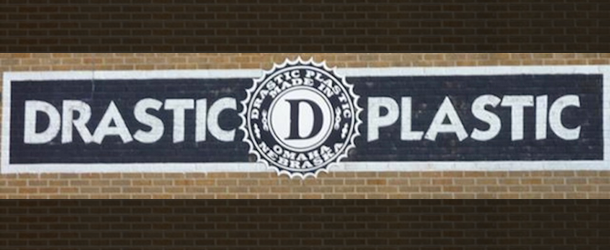[Editor’s note: This is the second of a three-part series profiling three record stores in Omaha’s Old Market, exploring how each differentiates itself from its nearby competition and how it remains financially viable while its industry is in flux.]
photos and words by Krystal Sidzyik
Rob Zombie avoids eye contact with fans trying to shake his hand on May 23 during his Record Store Day stop at Drastic Plastic in Omaha’s Old Market. Perhaps tired from digging through the ditches and burning through the witches he slams in the back of his Dragula, the former White Zombie frontman-turned solo musician-turned actor is a corporate subculture icon. His product — usually including some element of horror — sells due in large part to making parents uncomfortable. And in Omaha, he’s in the right place in the brick and mortar storefront at 1209 Howard St. Drastic Plastic has been outfitting Omaha’s subculture for 30 years.
When Mike Howard opened the store (then at 24th and N) in 1982, reaching disaffected youth was the point.
“His particular obsession was meant to be a punk rock alternative record store, which, at that time, there wasn’t really anything like that in Omaha,” says Drastic Plastic General Manager Neil Azevedo, sitting in his office at Drastic’s sister wholesale T-shirt business, Impact Merchandising at 24th and St. Mary's. “Those were the early days of the hardcore movement, particularly in Omaha. The hardcore movement started in the early 1970s in California, but bands like Black Flag and Minor Threat really came to symbolize that for the first generation of kids that it serviced.”
Other record stores around at the time, including Homer’s, catered to regular radio rock, Azevedo says. Drastic Plastic began to fully develop its punk/alternative following once it moved to its Old Market location — joining its competitors — across the street from Homer’s and around the corner from Antiquarium.
Last year marked the first time Americans spent more money on digital music than on physical copies, according to Nielson and Billboard. Azevedo believes that trend gives Drastic Plastic an advantage.
“We are sad that music isn’t a physical product and isn’t as strong, and it doesn’t seem like it’s ever going to come back, but the evolution does seem to have made us stronger,” he says.
Drastic Plastic has always carried more than just punk music. In 1983, no store in Omaha was really selling skateboards. Howard thought it made sense to carry items that corresponded with the music culture.
“Soon after, in 1985 and 1986, there were a lot of skateboard shops,” Azevedo says. “Staying ahead of the curve for the current trends was, for the subculture, studded bracelets and eventually T-shirts.”
Back in the 1990s, bands didn’t sell T-shirts at retail outlets, Azevedo says.
“Drastic bootlegged them, and then when Sonic Youth would come in through town, [the band] would come in and buy a bunch — it was all good-natured then,” he says. “The T-shirt business really took off.”
Today, Howard still cuts out the middleman by producing shirts, screen-printed concert posters and other tour merch through Impact Merchandising. Impact sells its products around the world through its online store, as well as on racks and shelves at Drastic.
But shirts haven’t replaced the stacks of new and used CDs and records that make Drastic, after all, a record store.
“We’ve always kind of thought of ourselves as a culture store, whose foundation is music,” Azevedo says. “We have carried music. We will always carry music.”
Still a drop in the bucket compared to digital and CD sales, vinyl sales are growing by 500 percent every year, Azevedo says. And Drastic specializes in vinyl plastic.
“We try to carry a smattering of new releases now, but primarily, when you look through the racks, it’s mostly the trieds-and-trues: The Clash, The Sex Pistols, Minor Threat, etc.,” Azevedo says. “That’s how we’ve always competed.”
Krystal Sidzyik is an intern at Hear Nebraska. She owns a Halloween T-shirt from Drastic and was unable to speak when she saw Rob Zombie. Reach her at krystals@hearnebraska.org.





